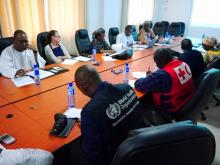Restoring Guinea’s Health Cluster
On 15 May, 2015, a meeting was held to reinvigorate the Health Cluster/Group in Guinea. In attendance were each of the UN agencies as well as international and national NGOs. With the onset of the Ebola epidemic in West Africa last year, the health cluster operations were paralyzed.
In recognition that health coordination is crucial to the final stages of the Ebola response, WHO called all organisations involved in the response to participate in monthly meetings. There are many actors on the ground currently working on the Ebola response, each with similar mandates and as such there is a need for strong coordination. The aim of these meetings is to create a space in which issues, experiences and recommendations can be shared amongst the key actors.
Since the outbreak of Ebola in Guinea just over a year ago, there has been a lot of conversation around building robust and resilient health systems and practices. This regular meeting will provide a platform for discussion around such topics. Through these meetings, WHO Representative Professor Jean-Marie Dangou hopes to ensure each of the organisations on the ground come together to deliver services more effectively.
Another key objective of these assemblies will be to provide the Ministry of Health in Guinea with a comprehensive map of where each of the partners are on the ground and their roles. Through frequent discussions, each organisation will be able to avoid duplication and continue working in line with the goals of the Ministry of Health particularly the implementation of the recovery plan.
“It is crucial for WHO to play this role in initiating the groundwork to prepare the Ministry of Health for the pledging conference in June 2015 in the United States,” Professor Dangou insisted. “We must assist the Ministry of Health to clarify and map partners’ roles and responsibilities to facilitate implementation of the recovery plan. It is also important to review and improve agreed partner engagement, finance coordination processes and identify and make plans to resolve possible obstacles to coordination and successful implementation.”
The WHO Representative reminded participants that although cases of Ebola remain relatively low in Guinea, there is still a strong possibility of flare ups, causing further problems for the country’s health systems and communities. With each of the key UN organisations, INGOs and NGOs in Guinea collaborating more closely, the focus will be on ending the Ebola epidemic and restoring health systems throughout Guinea.
_____________________________________________
For more information, please contact:
Pippa Haughton, Communications Officer WHO Guinea
Mobile: +224 624 980 069
Email: haughtonp [at] who.int




